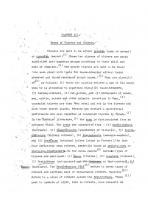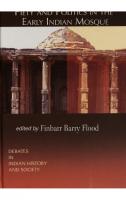Theft and robbery in early Indian records: Some Questions Regarding Theives and Robbers
Theft and robbery in early Indian records (2016) is a PhD thesis by the Researcher Kali Pada Hore under the Guide D. C.
194 28 2MB
English Pages 39 Year 2016
1. Recruitment
2. Habitat
3. Guilds
4. Dress, appearance, strength, etc
5. Thieves and the Fair sex
6. Patron Deities of Thieves
7. Patron Deities of Robbers
8. Conversion of Thieves and Robbers
References
Recommend Papers
File loading please wait...
Citation preview
CHAPTER VI
Some Questions Regarding Thieves and Robbersy 1, Recruitment Thieving and*robbery .had never been the monopoly of any particular caste or 'tribe. Indeed the profession vis's’open to everybody. Besides the poor^and the destitute, princes, sons ,of noblemen and even Brahmanas resorted to it. We have already referred to the Brahmans thief, Sarvilaka. On encountering s s^range-looking Brahmens in the Vindhys forest, prince Rajavahana requested him'to disclose his identity.- The Brahmans said,
1 Ihhthis forest dwell
many nominal Brahmanas, men who abandon scriptural end other 5'
* A
.
learning, spurn the duties of their order., -put away truth, purity ?*
V
and all the virtues.; who seek after sin, -following the lead of savages and eating their food, of one of these I was the reprobate '■$
_
.
AwX'O/rvd.
,4
son, and my name is' Matanga. With a barbarous leandr-, I would enter settlements, seise wealthy villagers with their wives and children, imprison them In the forest, plunder all their property, and destroy
•* v
.
(i)
them..*So I lived, a stranger to pity.'
Though robbers some-r
times drew to their ranks men of upper castes, robbery in an organized way was generally practised by low-class ^people and wild tribes so much so that^from the Vedic times onwards, such people •have.always been disparagingly described as 'thieves and robbers in literature and folk^tales.
, *•"
In fiction, -‘atjleast, the names of the wild tribes, such as Sabaras, Pulindas, Nisedaa, Klratas and the like, have lost every trace of the ethnic or geographic meaning which they bore in an older j time. In fiction the entire list is synonymous with organized
brigand's and their names' are used without any sign of differentiation."(3)
.
•
2. Habitat
-(44- like the
Thieves generally lived in desolate places
outskirts of villages,towns, in underground caverns near deserted temples or cemeterie^v^Sometimes they also lived in villages, hills and forests. The cave of a thief was luxuriously furnished and illuminated''by blazing lamps. ^ King Virabahu entered a thief-’’s cave where there were beautiful women adorned- with many jewels full of ever new delights and looking like the city of shakes.
(6)
Numerous families of thieves lived in therc©ves, which, shut in by bamboo network, were in the recesses of the mountain Vaibhara.
(?)
Thieves generally frequented public roads, bathing places, places of pilgrimage, temples, wine-shops, gambling houses, brothels and ,v& oJLqo A yv\ em Vl es’yul-^the like which will be described- ir_detaAl in a subsequent chapter. A
A
Robbers generally lived in forests, hills, borders of kingdoms, and * /* in villages of their own. A few names of the forests haunted by robbers have been preserved in literature and folktales though it it difficult to say whether all of them were real or fictitious names. These are the Vindhys, Raudra, oh the Durgatllak© mountain, .Sadurgadri, Kadamberi, Dantaraktikaq Hintala, the jungles of the _
—
Vaibhara mountain near Rsjagrha, etotf.
(8)
•
There were certainly
dense forests haunted by robbers on or near important trade-routes connecting great cities and ports like Sravasti, Rratisthana, /
__
/Q
)
Rajagrha, Tsksasila, Tamraliptl, Vidisa, etc.'7 As pointed out , ‘ ‘ __ (10) earlier, the Vedabbha Jataka speaks of a forest which lay on
172
- V
'
_i_
the road that connected the Varanasi and Cedi countries as being Infested Ty two gangs of 500 robbers each. As already mentioned, Hin/en-Tseng speaks.of forests in the Punjab, on the bank of the Ganges end ’also in many parts of India which were haunted by ferocious robbersPl/he Vindhya forests, notorious for brigandage, have been described thus : 'Here hundreds of lions are killed by the mounts.in-tribe chiefs who are eager to possess pearljbeeds of the frontal globes of elephants clinging to the tips ’of their claws. The forest looks like the city of the God of Death, because it is as fearful as the haunt of death. Like an army ready for battle, with arrows fixed to bows, and with the raising of the warcries, it has been^resting on bane and asana trees and dinning A
w
en^d^if4f—TTtm lampblack.1 On his forehead 'was an involuntaryfnbwn which branched in three lines; his ear had an ear-ring of>glass-like. crystal fastened in it, and it assumed a grepzfjme from a parrot's wing ■which ornamented it, while his somewhat bleared* eye, with Its scanty lashes, seemed bvi^ts native colouring to distil hyena's blood which had heepoapplied as a medicine, — his nose was flat, his lower lip thick,' his chin low, his jaws full, his forehead and cheek-bones projecting, his neck a littke bent down while one half of has shoulders stood up, — he seemed to mock the broad rockp/of the Vindhyas side with his brawny chest, which was broad ened by exercise and hardened by Incessantly bending his bow,
•
183
ian a boa-constrictor, the Himalaya, be wore a
I
l
beads, which was placed
iovered with a bundle of an antidote against poison) rs; he had a. thin belly >lns were rendered f ormidi anointed with quick silver l,
— it was wrapped in a
covering, and its sheath itraka snake, placed rani snake. His brawny had as it were fallen down spare in his early youth; om with a leathern quiver ped round with a spotted h the bees that clustered stly crescent-shaped heads.' sting on his left shoulder .ment of peacock’s gall, and was full of fierce vigour and with ire sinews fashioned of Khadlra roots, while the top of the arm wasvgay with a blue jay's tall fastened on the upper part. His right hand seemed busily engaged with a Vikarna arrow having its point bm the Vindhya', an expert^hunter, 'the personified essencp^of destruction, the efnbodied ~P?Vlit
of sin, the cause of the Kalfage, the lover of dobra's night. Rajavahana • saw a robber 'covered with scars of wounds
inflicted by weapons, whose body was as hard as iron, whose Brahmanshood was inferable from.his sacred thread'(but) who clearly displayed the valour of a Kirata and who was hideous to look was as strong as an elephan^.^The robber named Sattuka m-)
-
^
robber
(454
Angulimala' possessed the strength of seven elephants and was cruel and given to killing. He killed man after man and hung round his shoulder^, a garland made of their fingers. He made the forestpath, villages and towns deserted and created a great panic. He could kill forty men at a time and could overtake and catch elephants, A
ayr^i
[&)
~•
horses, chariots,^deer even when running. The robber-chief Kayavya could defeat many hundreds of soldiers.
V;
('?©-)-
The bandit Abhaggasena
inflicted a crushing defeat upon a king'; The brigand-chief Vijaya was 'full of valour, giver of hard blows, hitter of an object at its sound, a chaj/mpion-wielder of the sword, exercising sway over four hundred robbers.'^ The King of the Klratas, Saktiraksita joined Mrgankadatta with ten hundred thousand footmen, two hundred thousand *
horses a myriad of furious elephahts on which heroes were- mounted and eighty-eight thousand chariots. His banners and umbrell^gdarkened the heaven.
Durgepisaca.,
the King of the Matangas was of terrible
valour. No king could conquer him and he commanded 'a hundred thousand bowmen of that tribe, everyone of whom is followed by five hundred .warriors.' With their help he plundered caravans and destroyed his
(vg)
(75)
enemiesV'B Bhills chief was king over six lakhs,,*.
According to
-:
185
the Mahsbharatas,. the Kiratas came from the northern hills,
’ridden
by fierce robbers of strong limbs, the foremost of warriors, encased in steel coats of mail; among them are persons bom of the cow or of the ape., or of various other creatures, and also bom of men., That division of the assembled Mlecchas, who are ell sinful and come from the fastness of Himavst, seem at a distance to be of a smoky colour. They have elephants with impenetrably skins, well-s trained . . . . adorned with armour of solid gold, and resembling Alrsvata '. ^ ^ According to the Mahibharata^i;he progenitor of the Nisadas and Mlecchas was a deformed, blabk-haired, red-eyed ' --------------------- -
dwar^jt. In short, most of the robbers and members of the criminal tribes were ugly, cruel but bold and strong.
Though paradoxical, thieves and robbers were fortunate in captivating the hearts of ladies who staked everything to have them as husbands. Even married women could not resist the tempta tion of thplr rough beauty, and often eloped with them. This strange, infatuation of ladles for these outlaws may be explained by their robust health and manly bearing. The cruel tortures generally inflicted upon them while being led to the place of execution might have also moved the soft hearts of these women to pity. It should also be remembered that the criminals with whom they fell in love were often sons of beautiful prostitutes1, or adventure-loving princes, or reprobate sons of rich peoplet They therefore, Inherited attractive physical beauty. Rich prostitutes had generally 1
©
186 :_
— (77)
fascination for these law-breakem. Rstnavatl,
daughter of a
rich merchant, became suddenly distracted with love as she saw a thief being led by policemen to the place of execution. At her earnest request, hpr father offered his entire wealth as the thief’s ransom but the king refused to set him free. The^irl then went near the stake upon which her beloved was impaled, had his body brought dowh and then lay in the funeral pyre with the corpse'. (78) In a similar tgle, a girl forced her father to bribe a police officer to get a thief released from bonds. Such romantic tales are numerous. The thief^ Karpara having entered the bed chamber of a princess succeeded 1 in winning her ^Another thief ■
■ (®P
secretly married a princess In a lonely island. The wife of a younejfmanfelt a strong passion for a robber-chief who was-an A C-finj tk.sj-xjlJ-
concerned- in a fight by her husband and when her husband asked her
A
’
to give him the sword, she put it in the robber^s hand and he lost no time in killing the husbanct.^Another married women went C&£ out at night to visit her paramour who was a thief. Dharana's wife
eloped with a thief,leaving her husband who was asleep
(si)
in a temple. Numerous
(W*
are the cases of elopement of licentious
wives with thieves and robbers 4 A rich courtezan, Sama
sent one thousand gold coins
to a police officer to purchase the freedom of a condemned robber of god-like appearance with whom she fell in love while he was being led to the place of execution. As the officer demanded a man to be the criminal's substitute, Same-sent one of her lovers, to the officer and got her beloved released ^he town-belle, Su.lss']^> out of sympathy for a condemned robber with whom she was formerly
18?
acquainted
sent him some sweetmeats and water with a request to
C2O
the town-watchman to allow him to eat: and drink. Beautiful prosti^
fa
tes like R&gamsnjariand Kadsniki^ 88^ deeply loved the thieves, Apsharavarman and .Servilaka respectively, though, it must be said they were not at first aware of their activities. Apahirevarmen also captivated the heart of a princess.
y
Robber-women
too
sometimes fell in love with handsome kings and'princes and saved' .them from being killedby their masters. A female slave of a thief secretly told King Virsketu who went to the cave of that thief to flee at once as it was dangerous to stay there. In another story, the sister of a thil'f signalled-a beautiful king to leave their
(91)
cave immediately.w
Sridatta
(-92-)
was saved from being.sacrificed
to Candlka 'by the daughter of a robber-chief, who fell in love
Cq 2.)
with him and made him her husband.
S
'
}=.
6. Patron-Deities of Thieves^
’While commenting on the influence of religion on the Thugs, Sleemen writes:
'Fever did the strength of religious faith
or the extraordinary domination which religion exercises over man's moral nature, find clearer Illustration.’^3) This remark is also applicable to the thieves end robbers of ancient India. They rareljr showed any compunction of conscience for comltting crimes which they regarded as their birthright, believed to be sanctioned by their gods, ^kands, Kali and others. Thieves and robbers punctiliously performed all the reli gious rites, had the names of their'gods and goddesses always on ,the lips and sometimes even released men from bonds if captured on
i
188
the day they worshipped their deity. (
9*0
Surys, Rudra end Skanda
were probably the three important patron-deities of the thieves. A Gto i ~fa^Jl jca. j The Rgveda refers to a: -sotefxxmj.. 1 Wa put. mpr. t.n •hVrr^gVi ^ r " AA 4u/>0A A ,i
his parents from going there and consequently they were mercilessly /
beaten up by the robbers. This wonderful regard for promise deeply impressed the bandits and they became his disciples. Once at night, fivehundred thieves came to a forest and placed their bags spoil^upon the body of a monk, who was then in a state of trance, mistaking it for the trunk of a tree. In the morning they realised their mistake, and became converted by that.hermit. A thief'*yv
(168)
who destroyed several times out of malice,
the property of the treasurer, Sumangala, was forced to beg his
pardon when he came to know that the treasurer, forgetting all hte unpardonable offences had made over to him, his religious merit
(t&ft
acquired by a1ms-giving. A lady made elaborate defences to guard \
her treasures against thieves and foiled all their attempts to burgle into her house. One night, leaving the house in the care of a maid servant, she went to listen to the preaching of the Law. Inspite of being repeatedly informed by her maid of the entrance of thieves into her house, she sternly refused to leave that place and rebuked her servant for disturbing her.-This extraordinary devotion to religious instructions changed the hearts of the !K>
'’thieves who restored to her all the stolen wealth, apologized and became monks. ^7°^
A Buddhist monk stood fearless when assailed
by some robbers. Being asked by them to explain this unusual bold ness, he said that the Buddha's teachings gave him this strength. This ,led the robbers to renounce the world. 4
(171)
The great Buddha
once greatly surprised the quick-footed robber, Angulimala as the latter failed to overtake him though he (the robber) was running at tspeed.When he asked the Buddha, to stand, still, he replied, 'I stand still J
Stand s€ill yourself J ' Being requested by — —^ 145. Ibid. 146. Rgveda,9 IX. 146 *
........
147., Kathas. , op .pit. , Vol. I, p. 9, Note'l. 148. Ibid., Vol. IX, *
'Foreword* by Sir Atul Chatterjee.
149. Kathas.. op.cit., Vol. VII, pp. 153ff.
* '+ 150/ Ibid., Vol. II, pp.yl4lff.
,
151. Ibid., Vol. VI, Chap. IXXII. 152. Kadambari. ed. Haridas^pp. 730ff. 153. Kautilya, XIV. 3. •
f,
*
154. Mrcchakatlka. ed.Kale, p. 116 (Commentary). 155. Sir Monier-Wiliiams, A Sanskrit English Dictionary, p.826. 156. Av 1 mar aka in Bhasanatakscakra. ed. Devadhar, p. l4l. 157. SanmukhakaIp%, :op.cit. , pp. -^2-. I-
158. Bloomfield in AJP. Vol. XLIV,( p. 123, *
159. Ibid., p.•220. 160. Boc.cit.
161. Rauhlneyacarltra (286ff.), opAcit.. pp. 159ff. 162, Bloomfield i& AJP, Vol. XLVII, p. 217. / _ p 163- Dasakdmaraoarita, trans. nyder, pp, 25ff. 164. Bloomfield in AJP, Vol. XLIV, p. 220. 165. Loc,cit.
208
/
_
166. Dasakumaracarlts , trans..Ryder, pp. lOOff. i6?. Buddhist Legends, op.elf.. Vol. XXIX, p. 245. 168. Ibid., p. 246. 169. Ibid., p. 301. 170.,Ibid., Vol. XXX, pp. 256ff. 171. -Mrs. Rhys Davids, Psalms of the Brethren, pp. 291ff, 172. Buddhist Legends. op.cl/t.,^pp. 7ff» 173* R.K.Mookerji, Harsa
p. 99.
174.* Buddhl s t Leg end s , op.clt. t Vol. XXVIII, p. 281. 1;75* Samuel Beal, Travels of Hlouen-Thsang, Vol. II, p. 154. 176. Buddhist Legends, op.cit., Vol. XXIX, pp. 24lff. 177. Ibid,,., pp. 2l8ff. !78.
SfBjEf.
Vol, XJII, p,197.
1-79. Ibid., P. 221. 180. Loc.cit. 181. Buddhist Legends, op.clt., Vol. XXX, p. 216. 182. Ibid., p. 222. 183. Ibid., Vol. XXX, pp. 7ff.
-: 0O0
*•










